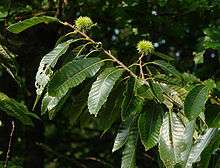chestnut
English

chestnuts
Etymology
Formerly chesten nut, from Middle English chesteyne, chasteine, from Old French chastaigne, from Latin castanea, from Ancient Greek καστάνεια (kastáneia).
Noun
chestnut (countable and uncountable, plural chestnuts)
- A tree or shrub of the genus Castanea.
- The nut of this tree or shrub.
- (uncountable) A dark, reddish-brown colour/color.
- chestnut colour:
- A reddish-brown horse.
- (uncountable) The wood of a chestnut tree.
- (idiomatic) (Often "old chestnut") An old joke; a worn-out meme, phrase, ploy, etc. so often repeated as to have grown tiresome or ineffective.
- A round or oval horny plate found on the inner side of the leg of a horse or other animal, similar to a birthmark on a human.
- (Britain) horse-chestnut
Synonyms
- (tree): chestnut tree
Derived terms
terms derived from chestnut (noun)
- American chestnut
- chestnut blight
- chestnut oak
- chestnut tree
- dwarf chestnut
- horse chestnut
Descendants
- → Gujarati: ચેસ્ટનટ (cesṭanaṭ)
Translations
chestnut tree — see chestnut tree
nut of the chestnut tree
|
|
reddish-brown colour
|
|
reddish-brown horse
wood of a chestnut tree
Translations
of a deep reddish-brown colour
|
Related terms
See also
- conker
- maroon
- water caltrop
- Appendix:Colors
Anagrams
This article is issued from
Wiktionary.
The text is licensed under Creative
Commons - Attribution - Sharealike.
Additional terms may apply for the media files.